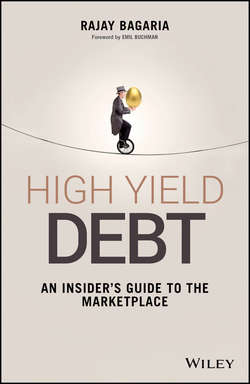High Yield Debt

Реклама. ООО «ЛитРес», ИНН: 7719571260.
Оглавление
Bagaria Rajay. High Yield Debt
Preface
Acknowledgments
About the Author
Foreword
CHAPTER 1. Development of the High Yield Industry
CHAPTER 2. High Yield Issuers
CHAPTER 3. Buying High Yield Debt
CHAPTER 4. High Yield Financial Concepts
CHAPTER 5. Debt Structures
CHAPTER 6. Credit Agreements and Legal Considerations
CHAPTER 7. High Yield Asset Class Performance
CHAPTER 8. Assessing the Market Opportunity
CHAPTER 9. 1940 Act High Yield Investment Funds
CHAPTER 10. Mezzanine Debt, Distressed Debt, and Credit Hedge Funds
Glossary
Index
WILEY END USER LICENSE AGREEMENT
Отрывок из книги
Today's U.S. corporate high yield market is worth over $2.5 trillion. That's more than the stock market capitalization of most countries including Germany, France, and Canada. Over 350 funds provide exposure to U.S. high yield including mutual funds, ETFs, and closed-end funds. In addition, a growing number of alternative funds such as distressed debt, mezzanine finance, and credit hedge funds also generate returns from high yield debt. High yield debt has never before been so accessible to both institutional and individual investors around the globe.
The attraction to high yield stems from its high risk-adjusted returns over time. High yield can be broken down into two market segments: high yield bonds and leveraged loans. Over the past 20 years, high yield bonds have produced high single-digit total returns comparable to the S&P 500 with less than half the annualized volatility.1 Leveraged loans have posted mid-single-digit returns with lower volatility than bonds and only one negative total return year in two decades.2 This performance is why pension funds, endowments, insurance companies, institutions, and retirees increasingly buy high yield as a source of current income and complement to dividend paying stocks.
.....
My goal in writing High Yield Debt: An Insider's Guide to the Marketplace is to explain the U.S. corporate high yield market in basic terms and as concisely as possible. This book will address how the market has evolved, who buys and issues high yield, high yield debt structures, asset class performance, and how to track and evaluate the market for investment opportunities in a variety of different funds. In writing this book, I make no assumptions about the audience's knowledge level; I assume that most industry jargon is confusing and requires explanation and I get into a fairly deep level of insight and analysis such that even experienced market professionals will find something new and interesting. I also seek to explain the most frequently asked questions I've received on high yield. Last, I include what I consider the most important historical market data so that this book can be referred back to over time on any areas of interest.
This book can be read either cover to cover, or consulted when topics of interest surface. The Contents outlines the book's progression. It lists key topics of common interest for easy reference. Many of these topics are questions I have been asked during investor meetings. Any potentially confusing terms are italicized and included in the Glossary. Each chapter contains an introduction and summary with key insights, which is relevant to subsequent chapters. While this can be kept as a reference book, I recommend at least skimming chapter summaries from start to finish to gain a better sense of the book's contents.
.....